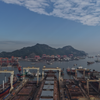How Global Shipping Market Impacted by Israeli-Palestinian Conflict

Introduction:
The ongoing Israeli-Palestinian conflict has far-reaching implications beyond the political and humanitarian aspects. The global shipping market, being an essential component of international trade, is not immune to the effects of this conflict. This article examines the potential impact of the Israeli-Palestinian conflict on the global shipping industry.
Disruption of Maritime Trade Routes:
The conflict could lead to the disruption of maritime trade routes in the region, affecting international shipping. The closure of ports, heightened security measures, and potential conflicts at sea may cause delays, diversions, and increased shipping costs.
Risk to Maritime Security:
The conflict raises concerns about maritime security, especially in the Mediterranean Sea and the Red Sea. Acts of piracy, attacks on vessels, and the potential for naval blockades could jeopardize the safety of ships and crews, leading to increased insurance premiums and reduced shipping efficiency.



Impact on Energy Supply:
The Middle East is a crucial hub for global energy supply, with significant oil and gas shipments passing through the region's waters. Any escalation of the conflict could disrupt oil and gas production, leading to supply chain disruptions and price volatility in the energy market.
Trade and Economic Uncertainty:
The Israeli-Palestinian conflict can create an atmosphere of uncertainty and instability, affecting trade and economic activities. Investors may hesitate to engage in business transactions, leading to reduced trade volumes and investment flows. This uncertainty can impact shipping demand and freight rates.
Regional Trade Diversion:
In times of conflict, countries may seek alternative trading partners or routes to mitigate risks. The Israeli-Palestinian conflict could potentially divert trade flows to other regions, impacting shipping patterns and potentially leading to overcapacity or congestion in alternative trade routes.



Humanitarian Aid Delivery:
The conflict may hinder the delivery of humanitarian aid to affected regions. Aid organizations rely heavily on shipping to transport essential supplies, including food, medicine, and shelter. Any disruption to shipping routes could impede the timely and efficient delivery of aid, exacerbating the humanitarian crisis.
Conclusion:
While the full extent of the impact on the global shipping market remains uncertain, the Israeli-Palestinian conflict has the potential to disrupt maritime trade routes, compromise maritime security, and create economic uncertainty. It is crucial for stakeholders in the shipping industry to closely monitor the situation and adopt contingency plans to mitigate potential risks. International cooperation and diplomatic efforts are essential to resolve the conflict and maintain stability in the region, ensuring the smooth functioning of the global shipping market.
-For more ship trade information, Please follow: www.vesselslink.com




